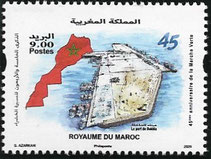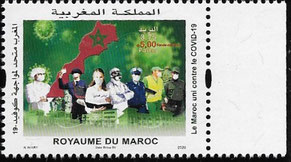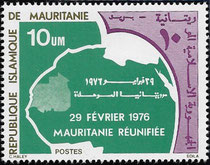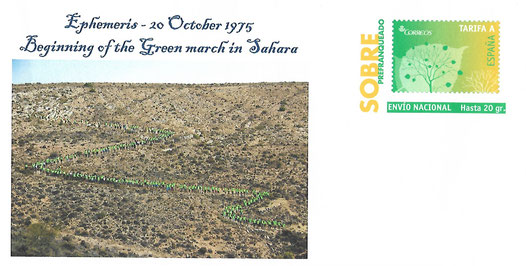Western Sahara
| Claimed by / Disputed by | Morocco / Western Sahara / Mauritania |
| Area | 266.000 km2 |
| Inhabitants | 600.000 (2020) |
| Claimed / Disputed | 1974 - Today |



Story
At 266.000 km2, the territory of Western Sahara is slightly larger than the old Federal Republic of Germany before reunification. With about 600.000
inhabitants today, the population is very sparse. In the north, Western Sahara largely borders Morocco and, with small parts, Algeria. The rest is enveloped by Mauritania. Due to Spain's
reluctance to hold a referendum on the future of its colony of Spanish Sahara, the Polisario Liberation Front (Popular Front for the Liberation of Saguía el Hamra and Río de Oro) was founded in
1973. This was recruited essentially from the indigenous Sahrawis. The Polisario began a guerrilla war against the Spanish. In 1974, Morocco and Mauritania declared their territorial claim to
Spanish Sahara.
Morocco's claim was based on an ideology of liberation from the colonial powers with the creation of a Greater Morocco. Attempts at mediation in 1974
failed.
When the United Nations presented a report in 1975 suggesting a referendum on self-determination, Morocco responded with the "Green March" of November 6-10, 1975,
in which 350.000 Moroccans, protected by Moroccan military, advanced a few kilometers into the territory of Western Sahara in a peaceful march. On November 14, an agreement was reached between
Spain, Morocco, and Mauritania that included the withdrawal of the Spanish and divided Western Sahara between Morocco and Mauritania. The Polisario did not recognize the agreement.
As a result, the Spanish withdrew, Morocco and Mauritania occupied the country, and the Polisario stepped up guerrilla warfare against the occupiers with logistical
support from Algeria. Under the impact of Polisario resistance, including on Mauritanian soil, Mauritania withdrew its claims in Western Sahara in 1979 and abandoned its occupation in the south
of Western Sahara. Morocco immediately followed suit and occupied the former Mauritanian portion with its own troops.
Until the cease-fire in 1991, the country was effectively divided into a part ruled by the Polisario, which was proclaimed the Sahrawi Arab Democratic Republic in
1984 and recognized by 50 states, and a much larger Moroccan part protected by a 2.500 km-long mined and barbed-wire-armed sand wall.
Intermittent efforts to end the conflict peacefully or through a referendum failed. In November 2020, the Polisario called off the ceasefire due to Moroccan
territorial gains.
Philately
Morocco regularly indicates its claim by issuing stamps dedicated to the memory of the Green March. Algeria has documented its support for the independence of Western Sahara with two stamps. Mauritania has issued a stamp commemorating its own claim. Stamps are also issued for the state, which was founded in 1984, but these are considered invalid by the UPU and Morocco and also have no postal significance, as there is no appropriate postal system to use them.
Morocco
Algeria
Mauretania
Mauretania, 1976, Reunificatin with Western Sahara
Spain
Spain 2013, entire of a series of ephemeric events, here "The Green March"




